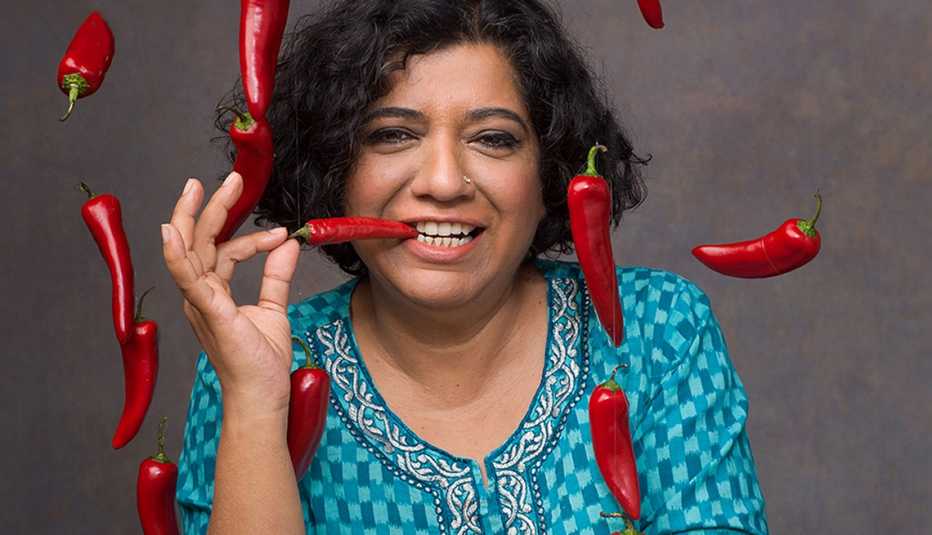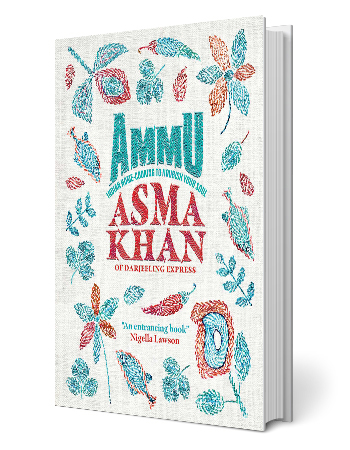Staying Fit


Chef Asma Khan gets her determination and fierceness from the same place many of us do — our mothers.


Cook With Asma
Chef Asma Khan shared three recipes from Ammu: Indian Home-Cooking to Nourish Your Soul for AARP members to try:
These are the halfway house between a chicken nugget and a spicy pakora that is sold in dhabas, or roadside eateries, along the Indian highway.
Everyday bread eaten by many families in India and meant to be eaten hot and immediately.
Sikandari Raan — Spiced Leg of Lamb
An inauspicious dish that takes time to cook, but it is worth the wait — and comes with a fascinating backstory.
“She’s someone who is very powerful and she’s not afraid, and this thing of being unafraid is something that I carry all the time. I should not be afraid,” Khan says. “I should deal with every challenge without fear and not think that I’m going to fail.” It’s no wonder, then, that Khan’s forthcoming cookbook, Ammu: Indian Home-Cooking to Nourish Your Soul, is dedicated to the woman who both inspired her to be bold and love food.
And that boldness shines through Khan, 52, in admirable ways. The Indian-born British chef is one of the world’s most prominent female chefs, and for good reason. At her London restaurant, the Darjeeling Express, she employs an all-women team of housewives to run the kitchen, and she was the first British chef featured on Netflix’s Chef’s Table, in Season 6. Her 2018 cookbook, Asma’s Indian Kitchen, won the U.K. category of the 2019 World Gourmand Award for Best Indian Cookbook, and Business Insider named her number 1 on their 2019 list of “The 100 Coolest People in Food and Drink.”
But even boldness was no match for COVID-19, which affected the restaurant world especially hard. When Khan had to close her restaurant at the start of the pandemic, she was struck with panic. Many of the women on her kitchen staff are Indian immigrants who send money back home and depend on Khan’s restaurant for support. In between pivots and lockdowns, Khan found herself with more time at home than ever before, sought comfort in the dishes of her childhood and spent more time with her two sons (ages 22 and 17). As Khan lost family members and friends to COVID-19, she knew it was time to put pen to paper and write the tribute to her mother that was itching to come out. She wasn’t going to wait until after her mother was gone. “I will write so that she sees this book in her lifetime. From all the fear and the kind of insecurity and the kind of uncertainty came this surety that I was writing this book,” she says.
It was Khan’s ammu (used affectionately for “mom”), after all, who taught the star chef how to cook as an adult. Living in Cambridge as a newlywed in an arranged marriage, Khan felt unmoored. In a pre-FaceTime world where international phone calls were expensive (and travel even more so), the isolation she experienced in her new home was intense. Although she had grown up watching her mother cook and run a catering business, Khan was inexperienced in the kitchen and couldn’t turn to the comfort food she longed for. “I felt bereft. I was in mourning. I felt everything beautiful in my life had gone,” Khan says. “She knew that if I could cook, I would be able to re-create, in my foreign land, the flavors and aromas as at home. She cooked with me, taught me how to cook. She understood completely that cooking was my way home.”
Khan approached these lessons in her mother’s Kolkata, India, kitchen with excitement and quickly realized that she wasn’t such a stranger to cooking after all. “Because I spent so much time with her in the kitchen, I knew all the aromas. I knew the techniques. I’d watched it. I’d just never done it, so I didn’t know how to cook. But once she was standing there, saying you do this and you do that, then I knew the next step, because I remember her giving instructions to the cooks,” she adds. She also spent time cooking with her mother-in-law in Dhaka, the capital of Bangladesh.


AARP Membership— $12 for your first year when you sign up for Automatic Renewal
Get instant access to members-only products and hundreds of discounts, a free second membership, and a subscription to AARP the Magazine.
The lessons lit a flame within her that she took back to England. Despite receiving a Ph.D. in British constitutional law, she knew that being a lawyer would not fulfill her. Cooking for people, though, and bringing joy to others through food sparked her. “I was in this kind of chaotic situation where I cooked and everything worked out perfectly in the end, and people loved it. I felt very powerful,” Khan says. This feeling of validation was a departure from how she felt as the second-born daughter in an Indian royal family. In India’s patriarchal society, sons are the heirs, and women can’t inherit property. When a boy is born, they’re celebrated, she says, while a second daughter’s birth is lamented. “When I cooked, I felt appreciated. And this was, for me, an exciting thing for people to like me and tell me I was a good cook.”
While Khan didn’t practice law in the courtroom, she pursued social justice through her career as a chef. She organized supper clubs in London and enlisted the help of Indian women, including home cooks and nannies. “Some of them were cleaners in care homes in hospitals, sending all their money back home to support their families and often husbands, as well, who didn’t work,” Khan says. She frequently questioned the women in her life who derided her birth and knew that this was her chance to uphold women. “I’m not leaving anyone behind. All of us are going to succeed equally,” she says. This commitment to building up other women was inspired, of course, by her ammu, who always ensured that Khan felt supported and valued. When she opened Darjeeling Express in 2018, she brought those same women into the kitchen, where she serves guests dishes that she grew up with. And they’re still with her at the new location of Darjeeling Express in Covent Garden, which opened in November.


































































You Might Also Like
13 Quick Questions for Chef Marcus Samuelsson
The man who created one of Harlem’s beloved anchor restaurants returns for ‘Iron Chef’ reboot
‘Sammy Hagar’s Cocktail Hits’ Offer Recipes for the Good Life
We’ve included recipes from the Red Rocker’s book for the Pomegranate Mojito and Pineapple Pina Colada
Paul Hollywood Wants You to Fall in Love With Baking
His new book, ‘Bake,’ shares top tips from ‘The Great British Bake Off’ judge